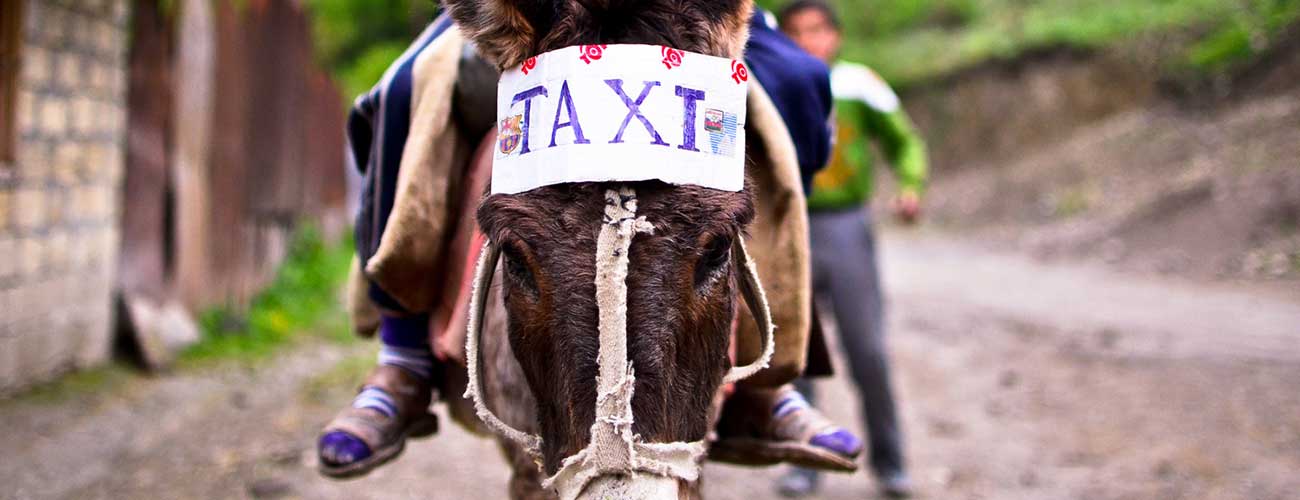Sign up for the daily CJR newsletter.
Taxi Taxi is like This American Life for the South Caucasus set, only without the three-act structure, episode themes, or, of course, Ira Glass. But the two podcasts share a style of storytelling that is rooted in place. In the first few episodes of Taxi Taxi, a Georgian country singer croons in a Nashville accent even though he’s never been within a thousand miles of Tennessee; a “farmer in heels” modernizes the countryside; a man is stabbed for teaching Nietzsche at a community center. The stories are silly, or funny, or sad, but they all lend insight into the cultures of their characters. The results are pretty magical. In Taxi Taxi, the foreign becomes familiar, and a region that many Americans couldn’t point to on a map comes alive.
Vladic Ravich, one of the show’s cofounders, became addicted to that part of the world as a young reporter, when he landed an internship in Azerbaijan at Eurasianet.org. Born in St. Petersburg and raised in Queens, something about the culture resonated with him. Though Ravich is now based in New York, he’s returned to the South Caucasus throughout his career, most recently for a nine-month stint on a Fulbright scholarship last year. It was during that stay that Ravich, together with fellow expat Billie Jean Stirewalt, started Taxi Taxi.
The three countries of the South Caucasus, Azerbaijan, Georgia, and Armenia–all formerly part of the Soviet Union–are young nations with long histories. It’s a vibrant place, ripe for storytelling; a place of simmering conflict, colliding cultures, and creeping modernization. The mountainous region is ethnically, religiously and linguistically diverse (there are 70 languages in Georgia alone, according to Episode 1 of Taxi Taxi), and has for centuries been influenced by the cultural juggernauts that surround it: Russia, Iran, and Turkey.
Ravich and Stirewalt are learning as they go, and Ravich is the first to admit it. They’re “ripping off stuff that we see other people doing and then figuring out how to make it work,” he says. In their first episode, Ravich and Stirewalt go to Dmanisi, a town in Georgia near the Armenian border, in search of five ancient skulls found in the area in 1991, and a point of pride for the region. “You could describe it as the place that god was born,” a resident tells Ravich, on the podcast. The pair are unsuccessful at locating the bones, which have been temporarily moved, and instead discuss whether the droppings they encounter are from deer or sheep. (Stirewalt notes, logically, that the quantity of droppings indicate sheep since deer don’t travel in large packs.)
It sounds charmingly amateur, or, as Ravich says, “highly experimental.” The later episodes (there are five to date) are more structured, usually with one of the hosts narrating a story built around a character. The most recent episode, which aired in March, about a volunteer teacher who was stabbed for teaching Nietzsche, was produced by a local video documentarian who was game to try a new medium.
And that’s the point. “The big thing is having local producers do more stuff,” says Ravich. The goal of the podcast is to reveal the region as a fascinating, human place without exoticizing it. And as much as he and Stirewalt know the area, they’re still foreigners. Working with local journalists is essential, but it also poses some challenges, says Ravich.
In New York, the journalist-cum-storyteller is a familiar creature, one that populates our podcast apps with tales of love, money, and startups; so for Ravich, starting a storytelling podcast wasn’t much of a leap. For the journalists in the South Caucasus, however, who are trained to do more news reporting and less storytelling, Taxi Taxi’s approach was novel.
So Ravich and Stirewalt started a radio club in Tbilisi, Georgia’s capital, with the hope of getting a few recruits to help produce episodes. Once a week, a group of radio aficionados or curious friends show up, share a few beers or a bottle of wine, and listen to some tape. At this point, there are more artists than journalists, says Stirewalt.
But Ravich is confident that once they prove the medium is viable, the demographics will shift. “The Balkans, the Caucasus, all these regions that are melting pots already, are perfect for this kind of experimentation,” says Ravich. That’s because an English-language podcast that tells stories with universal themes can cross borders and language barriers in ways traditional news media can’t.
Ravich and Stirewalt want the podcast to appeal to audiences both inside and outside the country, which is a tricky balance to find. “We want to avoid making our friends in the region roll their eyes,” says Ravich. Their litmus test is to ask themselves two questions: Are foreigners lost? Are locals bored?
Ravich is back in Bushwick now, wrapping up the last episode of the season, this one from an Azeri producer. He has a few more projects in the pipeline, including one that will probably require a trip back to the South Caucasus.
At least one, anyway.
Has America ever needed a media defender more than now? Help us by joining CJR today.







